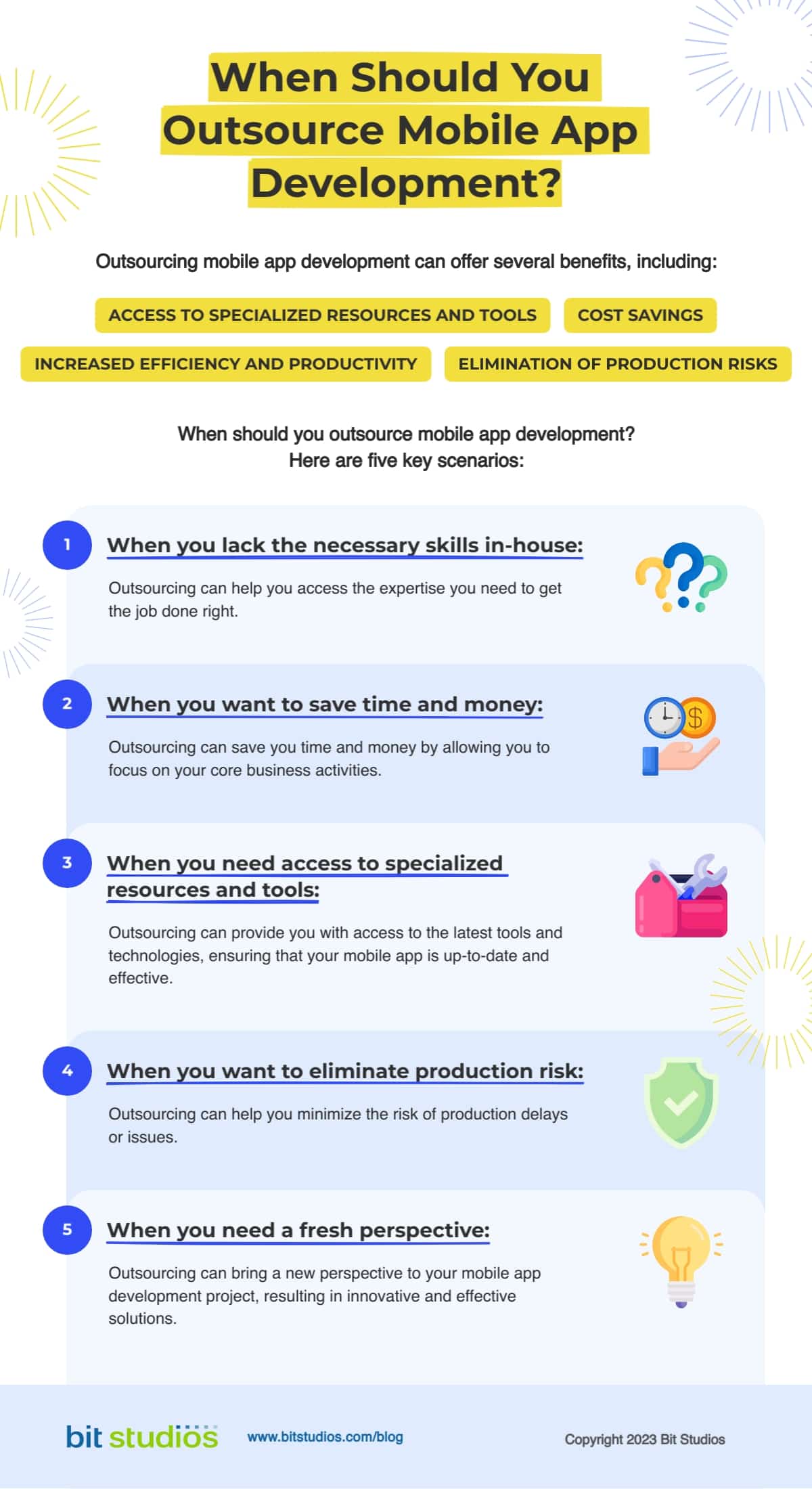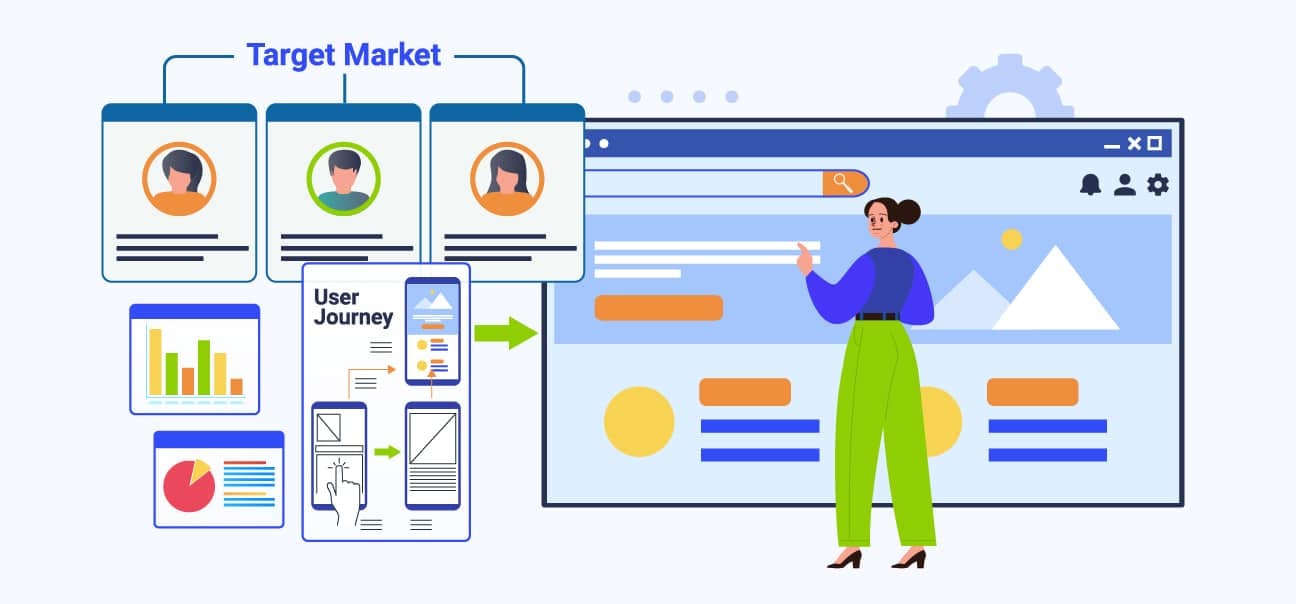Mobile App Development Outsourcing: A Complete Guide

Do you want to make your app development process more efficient and cost-effective? Mobile app development outsourcing may be the best solution for you. You can access a larger talent pool, get higher quality work done faster, and save money on labor costs.
But before you outsource app development, it’s essential to understand the benefits and steps involved in this process. This blog post will let you know everything about outsourcing mobile app development. You will learn the advantages of outsourcing and how to find the right app development companies for your project.
So let’s see what it takes to outsource mobile app development successfully!
Definition of Mobile App Development Outsourcing
Mobile development outsourcing involves hiring an external team or individual to complete software projects. In this arrangement, one company pays another outside firm to design, build, and develop a mobile application. Companies usually outsource when they don’t have the expertise or resources to handle a project in-house.
Moreover, mobile app outsourcing is a great way to do the job faster and cost-effectively. It also provides access to expertise and resources that may not be available in-house. Companies can outsource an entire app development process or just specific parts of it, such as coding or design.
Mobile development outsourcing can help your business save time and money while ensuring the quality of your app. But it’s essential to find a reliable and experienced partner who can meet your requirements.
Mobile App Development Outsourcing vs. In-House Development
Companies have two primary options when working on a development project: outsource app development or hire in-house developers. Each option has advantages and disadvantages you need to weigh before making decisions.
Here are the other differences between outsourcing app development and in-house development.
Cost
You can save more when you outsource app development than hiring in-house developers. Outsourcing has lower overhead costs and lets you tap global talent.
When you hire an in-house team, you still have to go through the lengthy hiring process, which can cost you time and money. Meanwhile, outsourcing means you will pay for the whole development project without extra costs.
Accessibility
With an in-house team, finding experienced professionals with all the necessary skills for a project can be challenging. You must understand software development or have technical recruiters who can hire the right person. If you want to hire overseas, you have to follow specific labor regulations and pay extra taxes.
But you can quickly access a global pool of experienced professionals when you outsource app developers. You only need to find reliable app development companies, and you’re good to go.
Quality of Work
When working with an external partner, you often get higher quality work. Outsourcing agencies specialize in certain areas and have better resources than an internal team. They also have experience working as a team in previous projects. It means they already have a proven process.
Speed & Efficiency
Speed and efficiency are two main benefits of outsourcing mobile app development. By working with an external partner, businesses can get higher quality work done faster than by hiring in-house developers. Outsourcing agencies specialize in certain areas and have better resources than an internal team. They also have experience working as a team on various projects.
Security
Outsourcing app development makes it easier to keep your data safe and secure. External partners typically have better security protocols to protect customer data. And if you are worried about leaking your company info, you can ask for a Non-Disclosure Agreement (NDA). Meanwhile, having an in-house team means you must invest sufficient resources to keep up with the latest security measures.
Communication
Maintaining direct and clear communication may be easier when you hire an in-house team. But partnering with a great outsourcing company can help avoid miscommunication. Those with years of experience in the industry already have proper communication protocols for their clients.
When Should You Outsource Mobile App Development
Outsourcing app development can benefit many companies. But there are some instances when you should outsource your project, such as:

1. When You Lack the Necessary Skills In-House
Suppose your in-house team doesn’t have the expertise or resources needed to develop a mobile application. In that case, it’s best to outsource the project. With outsourcing, you can quickly access a global pool of experienced professionals with different skill sets needed for your project.
2. When You Want to Save Time and Money
Outsourcing app development is often cheaper and more efficient than hiring in-house developers due to reduced overhead costs and access to talent worldwide. It also saves you time because the external team can get the job done faster than an in-house team could.
3. When You Need Access to Specialized Resources and Tools
When working with an external partner, you often get access to specialized resources and tools that may not be readily available in-house. An experienced development partner can provide you with the necessary resources and tools to complete your project quickly and efficiently.
4. When You Want to Eliminate Production Risk
When making a mobile app, there are many risks. Most mobile apps have a 75% chance of having problems. But if someone else makes the app for you, they will be less likely to have issues.
5. When You Need a Fresh Perspective
Developing fresh ideas and solutions can be difficult when you are too close to the project. Outsourcing mobile app development is an excellent way to bring new perspectives and ideas that can help improve your project.
Different Outsourcing Models: Pros and Cons
There are a few different models to outsource app development, each with its pros and cons. It’s important to understand these differences before you decide which model is best for your project.
Onshore Model
The onshore model involves hiring an individual or team in the same country as you. This model is ideal if you need a quick turnaround and want to maintain close communication with your development team.
Pros:
In this model, you have more control over the project and can easily communicate with your development team. Also, there can be tax benefits associated with onshore app development.
Cons:
The onshore model is more expensive than nearshore and offshore. It is due to the higher overhead costs of having a local team, especially if your country has an increased minimum wage. Also, finding the right skill sets in your local country can be challenging.
Offshore Model
Offshore mobile app development involves hiring an individual or team from another country. This model is ideal if you need a cost-effective solution and want to access talent worldwide.
Pros:
The main benefit of offshore mobile app development is that it’s more cost-effective than other outsourcing models. It is because it offers low overhead costs. You can also access talent from different countries, which can help speed up your project.
Cons:
Effective communication with an offshore team can be difficult due to language barriers and time zone differences. Also, finding a reliable and experienced partner who meets your requirements can be challenging.
Nearshore Model
The nearshore model involves hiring app developers from a neighboring country. This model is ideal if you need a cost-effective solution and want to access talent nearby. Most companies choose this method to work with talented developers within the same time zone.
Pros:
The main benefit of this model is that it’s more cost-effective than other outsourcing models due to the lower overhead costs associated with having a nearby team. You can also access talent from nearby countries, which can help speed up your project.
Cons:
Effective communication with a nearshore team can be difficult due to language barriers and cultural differences. There are also differences in legal regulations and holidays that can affect your production.
How To Outsource Mobile Application Development
When outsourcing mobile app development, finding a reliable and experienced partner who meets your requirements is essential. Here are the key factors to consider when finding the right partner for your project.
Step 1. Identify Project Requirements
Make sure the provider can meet your project requirements. Consider factors such as technology, budget, timeframe, and other needs. It also helps to lay out a realistic expectation of what you want the project to look like and what results you hope to achieve. With this step, you can be in line with the development process. It will also help understand how things work and if the team faces any issues.
Step 2. Do Your Research
Finding a provider with experience in outsourcing app development and a good reputation in the industry is essential. Look for reviews and references from previous clients and success stories that demonstrate their capabilities.
Step 3. Assess Cultural Compatibility
Cultural fit is essential when selecting a development partner. Ensure they have similar values and working styles with your team to collaborate successfully. It will help you avoid potential communication issues that can lead to costly delays and frustrations.
Step 4. Consider Post-launch Support and Maintenance
When outsourcing app developers, assessing their mobile app post-launch support and maintenance service is essential. Opting for quality maintenance services ensures that your mobile application remains stable and runs optimally. It can prevent unexpected disruptions and keep your project running smoothly.
Step 5. Ensure Sound Quality Assurance and Testing Procedures
To guarantee the best outsourcing experience, you must look into the company’s assurance and testing procedures. Make sure they conform to industry standards so that you can access the highest level of excellence possible.
Step 6. Decide on Software Development Model
Agreeing on the software development model before starting a project is essential. The most popular models are Agile and Waterfall. Be sure to discuss which one would best suit your needs.
- Waterfall Software Development
This method is a linear system where you do all the development stages one after another. It requires good project management since it requires more effort and time.
This process is a rapid development approach. It encourages the team to complete multiple phases of projects at the same time.
Step 7. Negotiate Payment Terms
Different providers offer varying pricing structures. Consider the cost of development and determine if it’s within your budget. Also, ensure that there are no hidden fees before signing a contract with your provider.
- Fixed-Price
The fixed-price model is the most common pricing structure to outsource app development. The provider charges a flat fee for the entire project in this arrangement. It makes planning and budgeting easier since you know what you are paying upfront.
- Time and Material (T&M)
For the time and material model, you will base your payment on the actual hours worked by the external team. The provider charges an hourly rate for the project, so you only pay for the time spent working on your project. This model allows you to quickly scale up or down your team as needed without worrying about additional overhead costs.
- Dedicated Team
The dedicated team model involves hiring an external team for a specific period. The provider charges a flat fee for the project’s duration. Moreover, you have complete control over the development process. It is ideal if you need to access talent quickly and cost-effectively.
- Outstaffing
Outstaffing involves outsourcing the entire team of mobile developers for a period. This model is perfect if you have long-term projects. You can also use this to find experienced professionals with different skills quickly.
Common Challenges When Outsourcing Mobile Application Development
When outsourcing mobile application development, you must be aware of the common challenges you might encounter. Here are some of the difficulties you may face and how to mitigate them:
Communication Barriers
When you outsource app development, communication barriers can arise due to language and cultural differences. Language barriers can lead to misunderstandings and delays in communication. At the same time, cultural differences can make it difficult for teams to work together effectively.
To promote better communication, being respectful and patient with your external team is essential. Make sure you set proper communication protocols and expectations for the team. It will ensure everyone is on the same page and working towards the same goals.
Time Zone Differences
Time zone differences can be a significant challenge when outsourcing mobile application development. It can be difficult for teams to stay in sync if there’s a considerable time difference between them. It can cause problems with communication and people needing to understand each other. It might delay the project timeline and not meet the quality standards.
It is why finding a partner in the same time zone as you are essential. You can also find a team that works with overlapping hours. It will ensure that your external team is available and can quickly respond to inquiries or changes.
Security Risks
Security risks are a significant concern when outsourcing mobile application development. As an external team handles the data and information, there is always the potential risk of unauthorized access or misuse of corporate information. For example, when unauthorized entities breach your development partner’s system, customer data stored in their platform could be compromised. There are also risks associated with data leakage and intellectual property theft.
But choosing app development companies with strict security protocols can easily prevent these issues. Ensure your provider complies with relevant industry standards, such as GDPR and HIPAA. Also, clearly understand the development partner’s security measures to ensure the safety of your data.
Tips For a Risk-Free Outsourcing Experience
Outsourcing mobile application development can be a risky endeavor. So, here are some helpful tips for a successful and risk-free experience:
Check for Money Back Guarantee
If unsatisfied with the results, ensure your provider has a money-back guarantee policy. This way, you can get a refund if something goes wrong.
Ask for an NDA
Aside from that, you can ask for a non-disclosure agreement (NDA). It will protect the critical information within your company. It will also assure you that your outsourcing partner will refrain from using your ideas and data for their other clients.
Monitor Projects Closely During Each Development Phase
Monitoring your project during each development phase is essential. It will help you stay informed about the progress and quickly address any issues that may arise. You can contact the company’s project manager to learn more about the process.
Reap the Benefits of Outsourcing Your App Development Project
Outsourcing mobile app development can be a great way to access more talent and save costs. But it is essential to understand the different outsourcing models and to properly vet your provider before making a decision. We hope you’ll get a successful and risk-free outsourcing experience with this complete guide.
But if you are still looking for a reliable outsourcing company, BIT Studios can help. Contact us, and we will help you experience seamless mobile app development outsourcing.
Mobile App Development Outsourcing FAQs
How Much Does Hiring an App Development Team Cost?
The cost of hiring outsourced app developers depends on a few factors. It includes the size and complexity of the project, the type of team you need (onshore, nearshore, or offshore), and the provider’s rates.
On average, an onshore app development team will cost around $200/hour. Meanwhile, an offshore provider will charge about $100/hour. Nearshoring may offer a slightly lower price depending on where you outsource.
When budgeting to outsource app development, consider the additional costs associated with setting up and managing your project.
Where Should You Outsource Your App Development Project?
When choosing a provider to outsource mobile app development, looking for one with experience in the field and a good reputation is essential. You must also consider technology, budget, timeframe, and other requirements.
Additionally, cultural compatibility between the companies is also essential when selecting a development partner. Strive to find a reliable and experienced partner who meets your requirements. Finding a company that offers post-launch support and maintenance for your project is also ideal.
How Much Does a Custom Mobile App Cost?
An app development cost depends on several factors, such as the complexity of the design, features, platform, and more. Generally, mobile apps can range from $40K to $60K or even higher for complex projects. But outsourcing your project can help you save costs since it eliminates the need to hire in-house developers.
What Is the Best Mobile App Development Model?
The best mobile app development model depends on the project’s requirements. Generally, most companies prefer using the Agile model because it allows teams to complete multiple phases of projects simultaneously. But if you have a long-term project and time is not an issue, you may also use a waterfall model.
How Can BIT Studios Answer My Mobile App Development Needs?
BIT Studios is an experienced mobile app development partner that can help you create high-quality apps while saving costs. We have a team of talented developers who are well-versed in various technologies and platforms. We also offer post-launch support and maintenance and have a proven track record of successful mobile app development projects. Contact us today to get started.
We’re BIT Studios!
At BIT Studios we specialize in designing, building, shipping, and scaling beautiful, usable products with blazing-fast efficiency



